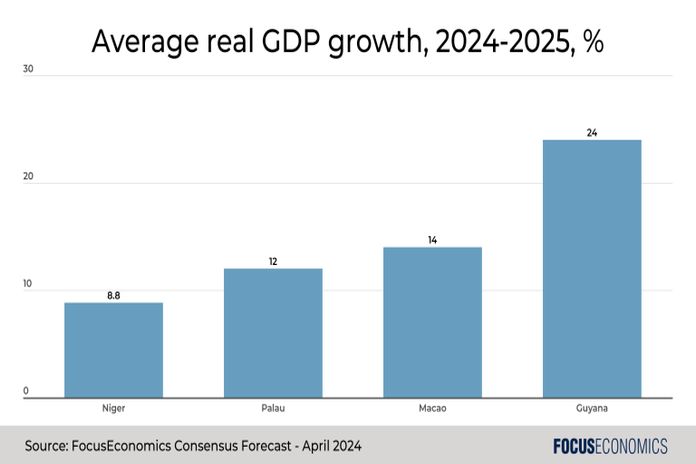By FocusEconomics
Our Consensus Forecast for world economic growth in 2024 and 2025 is muted at below 3 percent – among the slowest rates in decades – due to demographic aging, softer population growth, China’s slowdown and a more fragmented global trade environment.
But many smaller countries are projected to buck the trend, with our panelists even forecasting three economies to grow by double digits. Guyana GDP growth is set to be stellar, as is that of Macao, Palau and Niger.
At FocusEconomics, we forecast 198 countries, with those not covered in our regional PDFs available via our online platform.
Our consensus forecast is for Guyana GDP growth to come out on top
Guyana – a country that borders Venezuela in South America – should record average GDP growth of 24.0 percent in 2024–2025, according to our consensus forecast.
This will be due to Guyana’s oil output rising from virtually zero in 2019 to close to one million barrels per day over the next two years, fueling government spending and investment in turn.
However, a potential war with Venezuela over the disputed, resource-rich Essequibo region is a major downside risk, while the oil surge could lead to corruption and cronyism that hampers Guyana’s institutional development.
Macao to be second fastest-growing economy
Macao – a special administrative region of China akin to Hong Kong—is projected by our Consensus Forecast to expand around 14 percent in 2024–2025. This will be largely due to recoveries in the tourism and gambling sectors as mainland Chinese visitors return en masse following several years of tough lockdown restrictions. As such, Macao’s economic performance will hinge on that of mainland China, and could deteriorate suddenly in response to a recession on the mainland.
Palau to benefit from rising tourism
Palau – a nation formed of hundreds of islands in the Pacific Ocean – should record GDP growth of 12.0 percent on average this year and next. This will likely be due to a strong rebound in tourist arrivals from East Asia – the key driver of the economy. In 2023, visitor numbers were still well below pre-pandemic levels, highlighting still-elevated potential for catch-up growth. However, spikes in food and fuel prices will remain a key downside risk to our Consensus Forecast, given Palau’s dependence on imported goods. Extreme weather events and sea-level rises linked to climate change are also concerning.
Niger’s economy will get a boost from sanctions relief
The economy should see 9 percent growth on average this year and next, according to our panelists, with growth in 2024 forecast to be in double digits. Activity will be buoyed in 2024 by normalizing cross-border trade following the lifting earlier this year of sanctions imposed by other West African states in response to the 2023 coup. Moreover, oil production from the Agadem basin is expected to rise more than fivefold later this year thanks to a new Chinese-built pipeline. But heightened geopolitical instability will continue to hold back potential, and Niger will remain among the world’s poorest economies.
Insight from our panelists
On the oil sector’s contribution to Guyana GDP growth, EIU analysts said:
“We estimate average oil output of 642,400 barrels/day in 2023, which will continue rising to an average of 921,800 b/d in 2024‑25. The development of new oil blocks will also support growth in the short term as investments come in and fuel the local economy, but oil output from those new endeavours is likely to materialise beyond 2025.”
On Niger, Oxford Economics analysts said:
“Progress on Niger’s oil pipeline continues to advance steadily. Once completed, the 2,000 km Niger-Benin Oil Export Pipeline will be the longest cross-border crude oil pipeline in Africa. The conduit will feature nine pit stops with a pipeline capacity of 110,000 barrels per day (bpd), of which 90,000 bpd will be earmarked for export.”
– Originally published by FocusEconomics, April 12, 2024.





